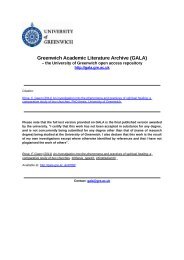Download (3483kB) - Greenwich Academic Literature Archive ...
Download (3483kB) - Greenwich Academic Literature Archive ...
Download (3483kB) - Greenwich Academic Literature Archive ...
- No tags were found...
You also want an ePaper? Increase the reach of your titles
YUMPU automatically turns print PDFs into web optimized ePapers that Google loves.
in the political environment - anti-racist, American identity, current affairs, recognition ofethnic actors and, interestingly, reconciliation - all rose after 1957. It appears that the years1957-59 were the most politically sensitive for reviewers and provided a watershed in theirattitude towards Hollywood.Racist comments were more directed to 'Indians' than to African Americans - reflectingthe much lower profile of the latter in films until the mid-1950s. In Tap Roots (1948), forexample, Boris Karloff played 'an Indian' though 'quite a civilised one'; an 'Indian' chiefprovides a 'comedy moment' in Santa Fe (1951); the 'Redskins' are denounced for'stupidity' in the way they attack the beleaguered whites in Escape from Fort Bravo(1953); Martin, in The Searchers, is called a 'semi-civilised half-breed' who 'in his griefreverts to pure Indian'; and Run of the Arrow is called an 'Indian cruelty pic.' The firstcomment regarding African Americans comes in a review of Friendly Persuasion by theNew York Times, which is not a comment but an omission. In identifying the Birdwellfamily the reviewer includes all the animals who have names, but not Enoch, the AfricanAmerican, who has an intimate relationship with the household but whose status is neverdescribed. A year later Sidney Poitier's role as Rau-Ru in Band of Angels is described as 'abeloved slave who gets fancy notions of brotherhood' at the same time as Orval Faubus,Governor of Alabama, was denying African American children the right to enter LittleRock Central High School. That is the last racist comment recorded by reviewers up to1968.In contrast to the racist comments, almost all the anti-racist comments relate to AfricanAmericans. The New Yorker points out that despite the fine liberal phrases in The Romanceof Rosy Ridge about 'wanting a free country for all folks' the film does not include oneAfrican American. A placid town in the South 'erupts into racial bigotry' when 'greedytownspeople attempt to drive off an old Negro by hiding under the cloak of the Ku KluxKlan' in Stars in My Crown. John Ford is accused of 'live and let live' despite the'attempted lynching' of a young African American boy in The Sun Shines Bright. Severalreviewers note approvingly the 'racial issues' raised in Band of Angels and the origins ofracial consciousness in Raintree County whilst, in 1968, Journey to Shiloh is seen as an'attack on racial prejudice.' 41 In line with the increasing acceptance of African Americansas part of the American nation there is increasing recognition of them as actors. In theperiod up to 1956 there are only two comments but these are followed by four in 1957-59.174
















